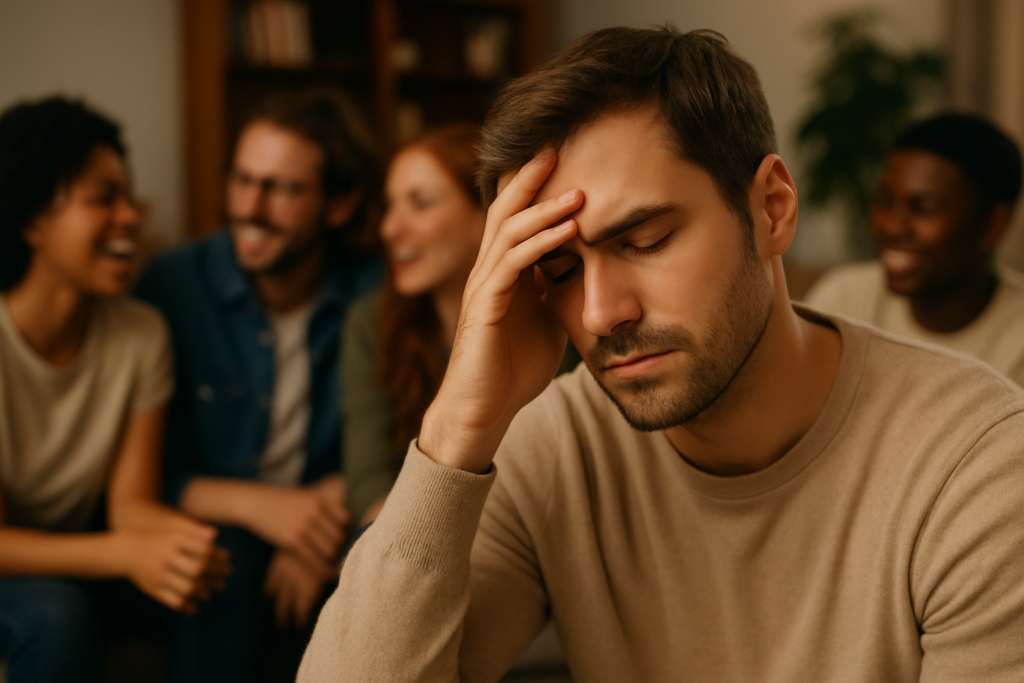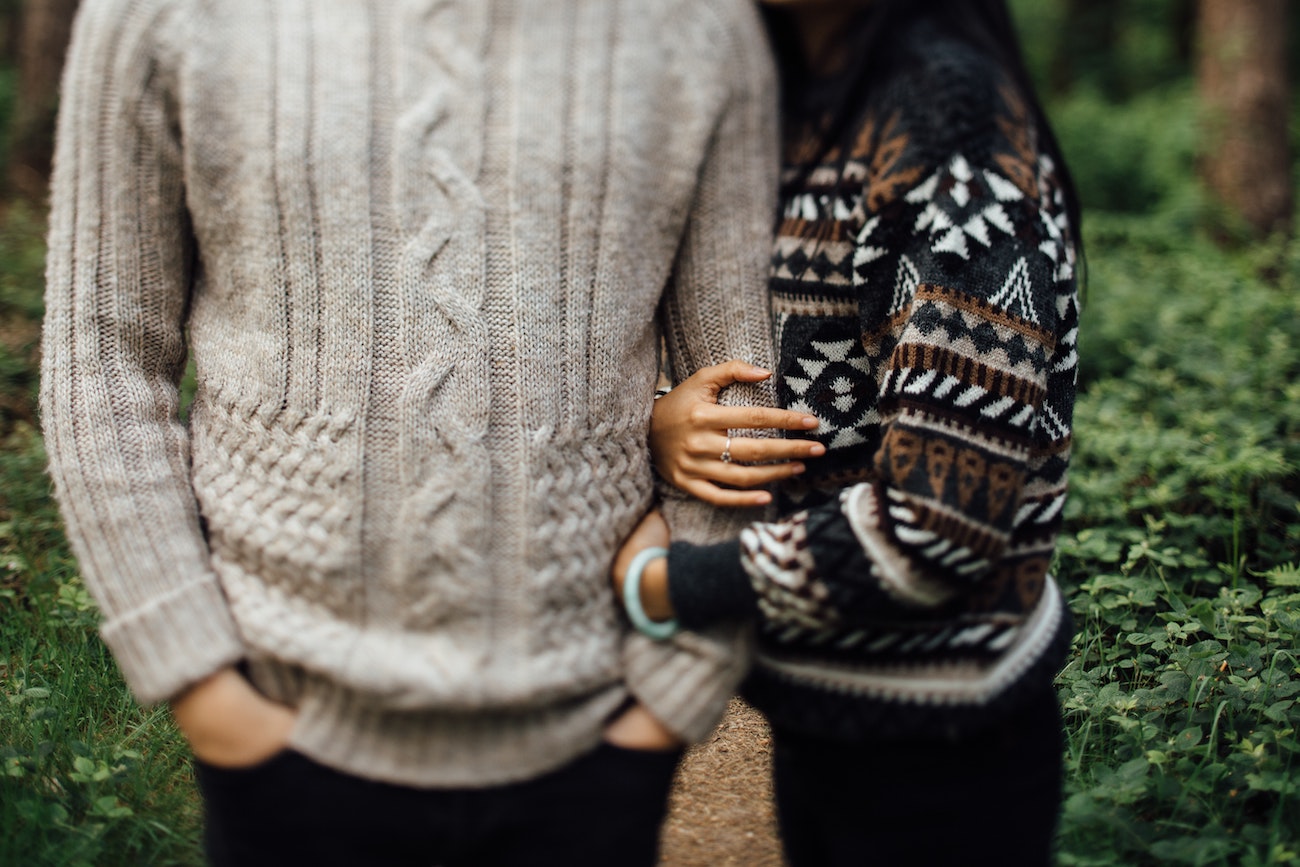If you’re wondering how to be a man in today’s world, you are certainly not alone.
Many men are wondering that alongside you.
One IA Client summed it up really well (in the same email he celebrated moving in with his two-year-long girlfriend… yay! A big milestone for him, and we’re thrilled).
He wrote:
Many attitudes and behaviors have traditionally defined masculinity. Today, society is telling us not to engage in the negative ones and is encouraging many of the positive ones in women.
That’s all good, but now I don’t know what attitudes or behaviors are both acceptable and specifically masculine. What does it mean to be a man today? I’d be interested in hearing your take on that.
I love this question.
The reason this is so important is that what it means to be a man has shifted a lot over the past decades and especially in the past few years, and we’re not done yet! So it deserves a fresh look at the past, present, and future.
I’ll be answering other aspects of his question (specific masculine traits; how to be a better man) in the next two posts in a series that begins with the one you’re reading now. (I’ll link to the other two here once they’re published.)
In this article below, I’ll compare-contrast old-world masculinity with what’s happening currently. Then I’ll share what I see as our whole next level beyond this. We’ll discuss the history of men from ancient times to now to what’s next.
Old-World Masculinity
Before the human rights movement and specifically the women’s rights movement, things were much different than they are today.
So, what did it mean to be a man before the human rights movements started?
In some ways, men were “at the top of the food chain.” But in many ways, they were drastically unfulfilled on a personal level.
For a long time, men’s existence was a loop of burden >> seemingly advantageous “ownership” as a result >> negative emotional outcome.
Let’s explore:
Men were responsible for providing for all.
While both men and women made significant contributions to the home, generally speaking, the gender lines were clear:
Men were responsible for financial and material well-being, while women were responsible for child-bearing and most of child-rearing.
Providing for everyone often felt like a lone burden. This was especially true when the means of provision did not match the work that a man’s heart desired to do.
For a long time, men didn’t choose jobs based on passion or even skill. They simply chose the family trade or what was accessible as a way to make money.
In exchange, they were in charge.
Alongside men’s role as decision-makers across the full range of organizations from corporate to home, for a long time, they had dominion over others.
Now, of course, some men had dominion over other men too. But there were not women who were in the spot to have dominion as an option, except for over children.
This dominion, a byproduct of the way society had been organized, tended to create distance and resentment.
The divide was there, even when power was not exploited. This was because it was not a situation of equals relating to equals, but of the in-charge relating to the not-in-charge.
The downside of dominion was disconnection.
Even though power over others may have appeal on the surface, this divide caused pain within the very men at the top of the food chain.
This is because they were not often seen for their full selves, but only for their contributions.
As a result of the system that placed them at the top, they ended up feeling disconnected.
The cavern of disconnect reverberated within themselves as individuals and within their relationships to others.
This was often the case even if they didn’t often realize much less articulate that.
As such, there was a dual “unseeing”…
They were unseen by the people they were providing for, and they were unseen by themselves emotionally and soulfully.
This combination, I believe, is a lot of what has led to the high rate of suicide and depression among men.
It’s the long history of not being respected as distinctly precious individuals, but only for what they can provide.
Today, even that isn’t as clear as it once was. Men now don’t even have as much of the, “Oh this is what I’m here for,” that gave them comfort and meaning in the past.
Summary of the “be a man” old-world loop:
The series of events we just went through can be summarized like this:
- The burden was that they provided for everyone, regardless of their own desires.
- The “ownership” they had put them in charge, which sounds nice but wasn’t really.
- The result of that was disconnection from self and others.
Another aspect of old-world masculinity was a crushing pressure to be “real men” with various initiation rituals across cultures and tribes.
Men entered into manhood via initiations.
Often, a young man was required to prove his manhood before becoming a legitimate adult in his society.
Cultures like the ancient Greeks (and even “Greek life” today) have performed initiations into manhood as a rite of passage.
At best, those rites of passage can speak to that part of a man that wants to be strong and overcome and prove himself. This is a natural desire inside men that manifests in one way or another.
At worst, rituals around rites of passage have been barbaric and dangerous, life-threatening, and gravely life-robbing in many cases.
What’s Happening Currently
Today, we have been engaging in a discussion as a culture regarding women’s rights and empowerment, which is very positive for society but has also been challenging for all parties.
What it means to be a man is shaped quite a lot by what it means to be a woman, since these are intertwined as yang and yin.
What it means to be a woman has certainly been changing quickly over the last hundred years or so.
In the past, women were not recognized as much more than physical property, the way one would regard a car or a piece of clothing (or a slave, which now ties into human rights since there have certainly been men and women slaves).
For a long time, women were regarded as property.
For example, Wikipedia states that while…
“Roman law recognized rape as a crime in which the victim bore no guilt and a capital crime,” it is also true that “the rape of a woman was considered an attack on her family and father’s honour, and rape victims were shamed for allowing the bad name in her father’s honour.”
Notice that nowhere in there was it a crime against the woman who endured the rape, but only against her male father. Also note in the last quoted sentence that she was shamed for what had been inflicted upon her.
Women bore the tremendous weight of not being treated as dignified human beings for a very long time. For generations, women were not seen and heard as human beings, but as property.
So, when the light switch got flipped on with women’s rights about 120 years ago, that was an extremely positive and necessary step forward for us as a human race.
Before #metoo, came the Women’s Rights Movement.
Today, in the year 2019, we’ve experienced a whole lot of emotion and triggering around where women’s rights intersect with men’s rights.
We have a lot of work to do yet, which I’ll get into below.
For now, let’s loop back to the original premise of the Women’s Rights Movement, which was fantastically straightforward and not at all divisive.
Note Wikipedia’s matter-of-fact helpful summation:
Issues commonly associated with notions of women’s rights include the right: to bodily integrity and autonomy, to be free from sexual violence, to vote, to hold public office, to enter into legal contracts, to have equal rights in family law, to work, to fair wages or equal pay, to have reproductive rights, to own property, to education.
That is quite clear, and I believe we can all certainly get behind that.
Up next…
After Women’s Rights came feminism.
Feminism is defined as “the advocacy of women’s rights on the basis of the equality of the sexes.”
This makes it sound the very same as the Women’s Rights Movement outlined above. However, over time, it has taken on a different tone than the dictionary definition.
To a lot of people, feminism is wrapped up in a feeling of anger, confusion, and women now being on top of men, rather than the equality that is clearly stated in the actual definition.
In response to how feminism has started to feel in popular culture, Hollywood, and more recently in social media, a lot of men have felt overlooked, blamed, shut out, and hopeless.
They feel this way while supporting feminism, while wanting women’s equality. Even while supporting women’s rights, many men are nevertheless unpleasantly confused and unsure of their place today:
As women started to take on rights that previously only men had held, like the right to work and to own property, things changed.
The gender roles that had been largely established down the middle of those rights (men who had rights and women who didn’t) became more topsy-turvy.
The #metoo movement started a few years ago.
Even once women had held the right to vote and to work for several years, there were a lot of ways where women were still being abused regarding their right to be free from sexual violence.
Similar to the ancient Roman culture, women often felt ashamed of what had happened to them and so didn’t speak out about it for years or ever. Or when they did, they were shushed. So they kept quiet.
When women began talking about how they had been abused, specifically and most often by men in power and namely in the workplace, two big things happened:
- Women finally had a voice and were heard, which is a tremendous leap in society to be celebrated.
- Men, though, especially the good-hearted ones, have become uncertain of how to relate to women today.
The men who most beautifully support women being bold and sharing what they had previously kept secret are the same men who have the most trouble knowing what is right to do or not.
This is especially true in terms of treating women with respect while still engaging in masculine leadership and pursuit in dating.
In fact, many women are vocal about not even wanting that. Even saying “hey” on the street is something that a lot of men are not sure about; they aren’t sure if that’s okay.
As a people, we have had difficulty in increasing women’s rights while also increasing men’s rights.
Men’s rights haven’t had the same attention yet.
Men’s issues are yet to be deeply and widely explored, and that’s what I’d like to make headway on today.
While men don’t need voting rights or the right to work, men do need more rights when it comes to…
- matters that apply to both sexes (freedom from sexual violence), and
- matters that apply to men uniquely (freedom to be seen and related to as a whole person, not objectified as a means to an end of provision).
Certainly, not all of those rights are violated constantly, but they are violated enough that they should be at least recognized as rights.
In different ways than how women have suffered, men have suffered too.
Many men have been hurting very much in silence all these years because they have worked hard to please others and to provide for others without having much of an outlet to be themselves.
Next-Level Manhood
The first step to next-level manhood is to acknowledge the current state of manhood.
There are two big oppressions that men face today:
- They aren’t free to share or be seen for their true selves.
- They don’t know where their place in the world is.
So how do we resolve this?
Our next level is letting men share how they feel.
Women are sharing how we feel, which is wonderful, and I am so glad for that (as long as it is respectful and pure-hearted… more on that in a later post in this series!).
Now it is time for men to be able to share too.
The New York Times wrote a piece in early 2019 on a song that addresses some of the difficulties men are becoming aware of and starting to express today.
The piece quotes British singer/songwriter, Sam Fender:
While writing the song, Mr. Fender learned that 84 British men commit suicide each week; another friend killed himself after he finished recording the song. Mr. Fender blames those losses, in part, on “a world where men don’t feel they can talk about their problems, no matter how bad they are,” he said. “I started to question all the archaic ideas of what a bloke is supposed to be.”
This shows the feelings of a lot of men. It’s important to now be able to talk about real things men are experiencing, including the painful and personal things.
It’s time to value men’s emotional wellbeing.
Because of the long history of provision and putting the needs of other people and of organizations above their own, it will be so healing for men to value themselves and how they feel.
While it is heroic to sacrifice for others, it is heroic AND enjoyable to be the best one can be while also being the best for oneself.
This is new for most men individually and for men as a group.
So having generous guidance on how to relate to yourself as a whole person, not just a means to an end for someone else, is quite helpful.
In another piece, The New York Times shares about the ManKind Project, which helps men develop emotional literacy through in-person workshops they hold for men:
Ranging in age from 30 to 70, the men were gathered as part of the ManKind Project (MKP), a 33-year-old nonprofit with 24 chapters in the United States and 11 regions abroad. It focuses on men’s emotional well-being, drawing on elements like Carl Jung’s theories of the psyche, nonviolent communication, breath work, Native American customs, and good old-fashioned male bonding.
I love that things like this are happening for men today.
Next-level is respecting men’s courage.
Men demonstrate everyday courage that is typically overlooked. It’s often seen as, “Well, yeah, they have to do that”… but who said?
They don’t *have* to; they simply do. Because men are provisional and sacrificial by nature.
Our next level as a species is to clarify how men can bring out their unique leadership strengths.
As we appreciate men’s courage, we can also support them in channeling their courage into what is best for *them*.
When they are doing what they love, they can become naturally more emotionally present to themselves and to others.
This extends their provision in new ways. Not only does it feel wonderful to them to be more present for others; being true to themselves also encompasses their own wellbeing instead of upshifting past it straight to others.
What is men’s place today and in the future?
More than ever, men have the opportunity to grow and develop uniquely, to be their very best selves.
Going after what they want and living a life that is fulfilling to them personally means living beyond an existence that puts bread on the table. As dignified as providing is, men were always meant for way, way more than that.
They are meant to be related to and seen as and appreciated as more than that.
Just as women are whole people (yay for no more being called property!); men are whole people too (including emotional range and soul!).
Every single day is valuable here on earth.
As a man, as a human being, you deserve to live not only for the good of others, but for the good of yourself.
Happily, when you live for the true good of yourself, then it ends up being also very good for others. This is especially true when you have a kind and honest heart and are committed to doing the right thing.
This is what I mean by the term Benevolent Badass. It’s real people being the best they can be, for themselves, and also for others… and, again, for themselves.
Thankfully, we’re evolving past the zero-sum game.
The vast majority of men want to understand how to be a man today in a way that feels good for them and for women…
They know that it’s not an inherently zero-sum game, where one side is in power and one side is not.
The land past zero-sum is one where both men and women can win together.
Many young boys today might be confused about how to enter the “real world”… May they heed the call to live a deeply satisfying life, not just one that serves a function in society.
And for the men later on in life, it’s never too late to build a life that deep-down fulfills you.
That is something for you to discover and decide for yourself. Even the best books on manhood can’t tell you what being a true man means for you individually.
How To Be A Man Today
We’re on the cusp of an up-leveling in Western society.
Evolving past the mistreatment of women and the rigid expectations on men means a bright future for us. Where we’re going next is a win for all of us: man, woman, and child.
That said, any evolution, no matter how bright, does come along with growing pains.
Graciously navigating growing pains…
Right now as a society, our growing pains can look like feeling misunderstood, unheard, and divided.
To make those growing pains minimal, we can take a deep breath to first hear ourselves. And then we can turn our ears to hear others. It’s impossible to really hear others until we’ve heard ourselves.
To be minimally affected by the growing pains, let’s focus on what’s on the other side for us together. This includes not only women being respected fully in body, mind, and soul; but also men being respected and treasured for who they are uniquely, and as a gender.
Next steps for your own masculine development:
If you’d like to find out where your place is in the world, an excellent next step would be to discover the hidden qualities and distinctive values in you that make you wonderfully unique…
You don’t have to be a mysterious James Bond character to be strong and wonderful in your own rite… Check out the exercise in our ebook on developing your own vibe as an introverted man.
And if you’d like to get 1:1 support from a team of women who love men (that’s who we are here at Introverted Alpha), then check out the insightful layout and experience of our Become A Benevolent Badass program.










